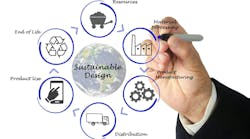Product News: Kelvin Maps to help organizations meet emission targets for 2030 and beyond
Kelvin has launched Kelvin Maps, a solution for measuring, monitoring and reducing enterprise carbon emissions.
Kelvin Maps intuitively presents vital production data to engineers and operators, delivering visualization of the entire operations, including the impacts of any inefficiencies driving emissions, they say, providing a unique view into the manufacturing and production processes while enabling companies to find emission-source offenders and reduce carbon footprints, leading to boosted profitability and sustainability.
“Global enterprises are struggling to capture emission levels across their supply chains and businesses. They must adopt a bottoms-up approach to boost transparency, visibility and measurement inside their operations,” said Peter Harding, founder and CEO of Kelvin. “Kelvin Maps helps enterprises and their supply chain partners hit net-zero goals by visualizing and optimizing the entire production process in detail. Our product helps find your problems and fix them in rapid time.”
“Kelvin Maps accelerates emissions disclosures and boosts the global emissions-control movement to meet their 2030 and 2050 emissions targets. With Kelvin, you can collaboratively find and fix production and operational issues that impact your carbon emissions,” added Harding.
Kelvin Maps simulates production scenarios and helps slash carbon output by plugging into an intuitive, interactive solution that actively simulates your production lines, per its maker. Kelvin Maps goes beyond traditional condition-based monitoring solutions to improve production outcomes and reduce maintenance costs with AI-driven intelligent operations.
According to Suhail Jiwani, chief technology officer of Kelvin, “With human-assisted and cognitive AI capabilities, Kelvin Maps creates a single source of truth for a complete facility or a production process, making it possible for engineers and operators on production lines to align on their approach to drive efficiency and reduce emissions. We unify human understanding with artificial intelligence to achieve real impact.”
Kelvin Maps boosts collaboration in real-time to help find new ways to produce more, reduce emissions, and drive efficiency to make smarter control decisions, they note. “We are transforming the way plants and factories operate, and the way executive leadership addresses carbon emission goals and production gains,” concluded Harding. “By providing engineers and operators immediate and aggregated information about the health of their assets as one system, we’ve helped reduce carbon emissions for our clients by up to 40%, while boosting production by 20%.”



